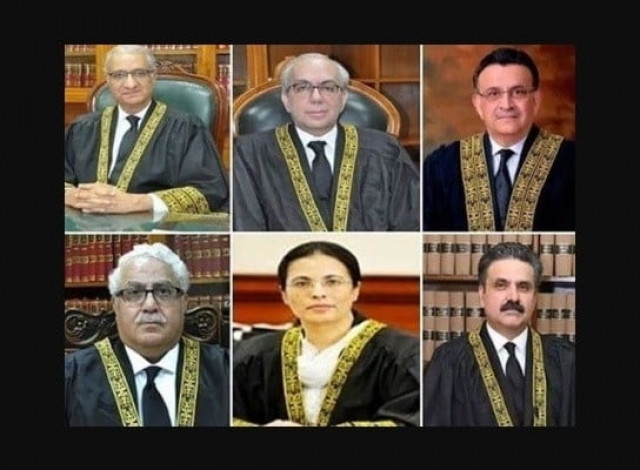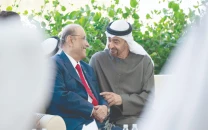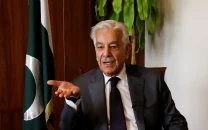SC won’t allow unconstitutional army steps: CJ
Apex court adjourns hearing on petitions against military trials of civilians indefinitely

Chief Justice Umar Ata Bandial observed on Thursday the Supreme Court would not allow the army to carry out any unconstitutional act, stressing that the military was meant to serve the country.
Leading a six-member bench for hearing of a set of petitions against the civilians’ trials in military courts, the chief justice emphasised that those who built their case on the Constitution and the law would be successful.
The bench, also including Justice Munib Akhtar, Justice Sayyed Mazahar Ali Akbar Naqvi, Justice Ayesha Malik and Justice Yahya Afridi, adjourned the hearing of the petitions for an indefinite period.
Chief Justice Bandial observed that the incidents of May 9 were of serious nature, adding that it pained him to hear remarks about the Pakistan Army being equipped to open fire on protestors on May 9.
Chief Justice Bandial added that the army was meant to serve the country. “The Pakistan Army did the right thing by not resorting to shooting citizens on May 9,” he said.
On May 9, violence erupted after the arrest of Pakistan Tehreek-e-Insaf (PTI) chairman in a graft case. The rioters also attacked government buildings and sensitive military installations.
Later, the authorities decided to try those involved in attacks, arson and damage to military installations, under the Army Act and the Official Secrets Act. The move was however, challenged in the apex court.
During the hearing, Attorney General for Pakistan (AGP) Mansoor Awan assured the court that the 102 civilian suspects, currently in the military custody would be treated fairly during the trial.
Awan said that his assurance came from the top military leadership, adding that concessions were being made for May 9 suspects on the court’s insistence. At one point, the AGP reminded the court that “the military is armed”.
“No efforts are being made to overturn the Constitution … What happened on May 9 is before everyone,” Awan told the court. “Remember one thing – they are the armed forces. If they are attacked, they have weapons to defend themselves.”
AGP Awan further said that the army was equipped to fire bullets. “It is not possible that if they are attacked [and] they first approach an SHO [police station house officer] to lodge a formal complaint,” he said.
“They [the military] could have opened fire on May 9,” the AGP added. However, this prompted Barrister Aitzaz Ahsan, one of the petitioners, to ask the AGP why the military did not open fire.
“We do not want that such a situation … when the army resorts to opening fire. This is why we are conducting [military] trials,” Awan said. Ahsan, then said that the government’s term ends on August 12, so “how can it give assurances then”.
At one point, Justice Munib Akhtar observed that the state could not deprive its citizens of their fundamental rights even if it wished to. He added that the trial of civilians in military courts was equivalent to running a parallel judicial system.
Justice Akhtar asked the AGP to comment on Articles 175 and 175 (3) of the Constitution, which pertain to the establishment and limits of courts. Awan replied: “Court martial doesn’t fall under the jurisdiction of Article 175.”
Justice Ayesha Malik asked the AGP whether there was any other provision in the Constitution to provide basis for his arguments. Justice Akhtar said that ensuring fundamental rights of citizens could not be left to the “sweet will of parliament”.
“The concept of fundamental human rights is such that the state cannot take them back even if it wants to,” Justice Akhtar remarked, emphasising that those rights had been guaranteed by the Constitution.
“Access to justice is part of fundamental rights,” observed Justice Malik. “If military courts are not [same as] a court of law, then trials conducted by them would be tantamount to a denial of fundamental rights,” she said.
Awan replied that military courts were similar to tribunals and dealt with people associated with the armed forces and defence institutions. “Court martial is not part of courts formed under Article 175, thus it doesn’t give the right to appeal.”
Chief Justice Umar Ata Bandial remarked that the bench was now reviewing the constitutionality of the trials of civilians for offences listed under the Army Act.
The court is now moving towards constitutional procedure and how a case goes before military courts, he said. Awan maintained that a civilian could be tried in a military court if they commit a crime related to the armed forces.
“But it is clearly written in the law and the Constitution that this law is applicable to those persons, who war with the armed forces,” remarked the chief justice.
In response, Awan cited precedent from a 2015 Supreme Court judgment, whereby the verdict mentioned attacks on military installations. He added that military courts were essential to countering anti-state elements and terrorists.
Officials Secrets Act
At the outset of the hearing, Ahsan told the court he wanted to read out four lines in court. “The parliament has passed a new law, which grants intelligence agencies the powers to search anyone at any time without warrant,” he said.
Barrister Ahsan claimed that this legislation had essentially given unlimited powers to the intelligence agencies. The apex court should take suo motu notice of the amendments to the Official Secrets Act.
“We do not know much about this matter, only read about it in the newspapers. The bill is yet under debate in the Senate. Let us see what the upper house does,” the chief justice said.
The CJP thanked Barrister Ahsan for raising the matter before the court, at which the latter observed that the situation currently prevailing in the country was similar to martial law.


















COMMENTS
Comments are moderated and generally will be posted if they are on-topic and not abusive.
For more information, please see our Comments FAQ